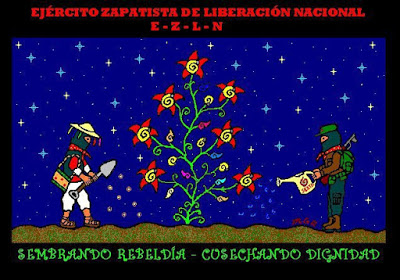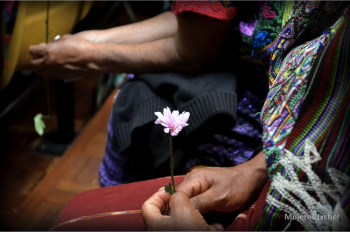
Topics

(Español) Ejido Tila: “Nos estamos gobernando de acuerdo a la libre determinación”

Chiapas. 28 de marzo. “NO NECESITAMOS QUIEN NOS GOBIERNE, NOS ESTAMOS GOBERNANDO DE ACUERDO A LA LIBRE DETERMINACION”, afirman indígenas Choles del ejido Tila, quienes desde el pasado 16 de diciembre tomaron en sus manos la gestión de sus tierras y retiraron a la presidencia municipal de su comunidad.
Las y los campesinos originarios del norte de Chiapas, informan que este domingo han colocado letreros en las entradas de pueblo de Tila, “por la constante amenaza del regreso de ayuntamiento apoyado con las fuerzas estatales”, y porque “en Tila seguimos dando los pasos haciendo nuestra #AutonomíaEjidal”, argumentan.
Un letrero que se lee a la entrada del pueblo de Tila indica claramente que:
-NO se permite la entrada del Ayuntamiento Municipal en este núcleo de población indígena chol.
-RESPETO a los acuerdos de la Asamblea General de ejidatarios que es la máxima autoridad como lo indica el artículo 2 al 33 de la legislación agraria.
-No necesitamos que nos gobierne, nos estamos gobernando de acuerdo a la libre determinación, como lo expresa el artículo 2 y 39 Constitucional.
-Respeten nuestros derechos constitucionales.
De igual forma los ejidatarios en resistencia han comunicado que como en estas fiestas acuden miles de peregrinos a Tila, como Autogobierno Ejidal, este año la seguridad está a cargo de la Comisión de Seguridad Ejidal, la cual coordina a los grupos de Guardias Ejidales, que cuidan las entradas al pueblo y la seguridad y vialidad en las calles y barrios, todo ello para para que los peregrinos sean bien recibidos.
(Español) Radios Comunitarias llaman a movilizarse contra la criminalización de la comunicación popular

Centro de Medios Libres-Radiozapote-La Voladora Radio.-
El Instituto Federal de Telecomunicaicones ha decidido apoyar una nueva campaña de criminalización hacia las radios comunitarias. Esta nueva campaña discursiva favorece a los actuales concesionarios y operarios de radio comercial por sobre el objetivo de esta instancia de regulación de interés público en donde está incluido proporcionar diversidad y calidad de contenidos radiofónicos que incluyan a la ciudadanía organizada a través de las radios comunitarias. En este artículo incluimos el comunicado dado a conocer por organizaciones sociales de la zona de Tlaxiaco y del estado de Oaxaca y un comunicado de una de las radios atacadas para ampliar nuestros argumentos.
“La radio comunitaria suele ser una estación de radio de corto alcance sin fines de lucro que responde a las necesidades de información de las personas que viven en un lugar determinado, en los idiomas y formatos que se adaptan mejor al contexto local. Como es la región Mixteca en la que existen diversas radios comunitarias como son la Máxima 107.9, la Perla de la Mixteca 96.5 FM, la Tlaxiaqueña 91.5 FM y Radical Stereo 98.3 FM de Tlaxiaco, San Juan Mixtepec, Radio Tigre de Santa María Cuquila, San Agustín Tlacotepec, Chalcatongo de Hidalgo, San Pedro y San Pablo Teposcolula, Santiago Yolomecatl y Radio Yucuixi de San Esteban Atatlahuca, entre otras y que estas radios son impulsadas por voluntarios de la comunidad para difundir su problemática y su cultura.”
No importa si la radio comunitaria ya está reconocida en la nueva Ley de Telecomunicaciones y en otros convenios internacionales ratificados por nuestro país, como radio de uso social y que sea una práctica ciudadana que existe de manera generalizada en diversas regiones del país. El IFT ha decidido aceptar y abanderar las presiones empresariales que desean excluir a estas transmisiones y ejercicios de comunicación social a través de un discurso que denosta y criminaliza su práctica.
“Las radios comunitarias tienen su base jurídica en el artículo 2 de la constitución federal de la republica que refiere:
VI. Extender la red de comunicaciones que permita la integración de las comunidades, mediante la construcción y ampliación de vías de comunicación y telecomunicación. establecer condiciones para que los pueblos y las comunidades indígenas puedan adquirir, operar y administrar medios de comunicación, en los términos que las leyes de la materia determinen.”
Se busca por robo, dice una imagen con un micrófono y un par de frases que criminalizan a las radios sin permisos. La imagen afirma que esa radio nos daña a todos y en concreto advierte que serán perseguidas por robar.
¿Qué roba una radio comunitaria? Una vez más entran a la discusión las afirmaciones que durante años se han debatido en el tema como por ejemplo que el espectro radioeléctrico es una propiedad de la nación, es decir de todxs lxs mexicanxs, pero se regula y reparte solo para quienes tienen dinero, e intereses políticos y económicos coincidentes con una visión de mercado neoliberal. La radio comunitaria surgió poniendo en tela de juicio esta condición y reivindica el aspecto de interés público y social por el que debería poder accederse a la transmisión y escucha de sus señales. Las presiones para la democratización del espectro radioeléctrico han sido muy fuertes en los últimos 15 años y la respuesta de esta fuerza política empresarial ha sido coercionar y controlar las instancias que pudieran tomar una decisión de apertura de los medios a la sociedad civil y ha bloqueado una y otra vez cualquier posible avance.
“Hace ya más de veinte años, la Corte Interamericana aclaró que, “la libertad de expresión no se agota en el reconocimiento teórico del derecho a hablar o escribir, sino que comprende además, inseparablemente, el derecho a fundar o utilizar cualquier medio apropiado para difundir el pensamiento y hacerlo llegar al mayor número de destinatarios”. Asimismo, la Corte Interamericana ha señalado que los medios de comunicación cumplen un papel esencial en tanto vehículo o instrumento para el ejercicio de la libertad de expresión e información, en sus dimensiones individual y colectiva, en una sociedad democrática, En efecto, los medios de comunicación tienen la tarea de transmitir toda clase de informaciones y opiniones sobre asuntos de interés general que el público tiene derecho a recibir y valorar de manera autónoma. En tal sentido, la jurisprudencia y la doctrina regional han reiterado que la existencia de medios de comunicación libres, independientes, vigorosos, pluralistas y diversos, es esencial para el adecuado funcionamiento de una sociedad democrática.”
La radio comunitaria no basa sus fundamentos en la explotación comercial del canal de transmisiónradios, sino en una serie de formas colectivizadas de creación y transmisión de contenidos, en donde lo comercial o lucrativo es una herramienta al servicio delas necesidades basicas para mantener la producción , transmisiones e infraestructura, mas allá de el interés de acumular riqueza, este principio, que se aplica a todas las transmisiones que se reivindican comunitarias, se enfrenta de manera directa con los argumentos de robo o los argumentos alucinantes de competencia desleal que argumentan los representantes políticos de los empresarios en los espacios legislativos Por el contrario son los intereses económicos, los intereses de sacar el mayor provecho económico y comercial los que mueven a los concesionarios a actuar criminalizando a el sector de la población que no tiene essos objetivos, son ellos quienes están interesados en la cohersion, el cohecho y el robo a través de presionar al instituto de regulación en la materia, que por lo visto es muy débil y sumiso para aceptar estas condiciones que se traducen en ataques violentos a las radios comunitarias , arresto y procesamiento judicial a sus integrantes y al decomiso y a la destrucción de equipos. Como se dice en la radio de brasil “los piratas son ellos. Ellos son los que quieren el oro”
Ahora se suma al panorama de violencia contra la población, este tipo de mensajes que acusan de robo a quienes hacen una labor social y comunitaria para dar a conocer el acontecer y la cultura local y brindar un espacio de intercambio de ideas y puntos de vista a sus comunidades y pueblos. Este nuevo perfil de criminalización es la reiteración de un discurso que había quedado en el olvido porque surtió poco efecto en el pasado y dio a las radios comunitarias la oportunidad de responder de manera directa a los argumentos empresariales del porqué de su existencia y de sus motivaciones. Sin embargo el discurso es peligroso, es de linchamiento y denostación, y no está solo en los medios sino va a acompañado del cierre de estaciones y de otras acciones de hostigamiento a estas transmisiones. Es real que este discurso excluyente y antidemocrático provocará una ampliación de un escenario de conflicto, como si en este país ahora hicieran falta más de estos espacios de conflictividad y enfrentamiento social.
“Gracias a las organizaciones sociales, a las autoridades de diferentes comunidades, al magisterio, pero sobre todo a ti que has confiado desde el inicio de este proyecto; que ha servido para escuchar a quienes no tenían voz, a quienes no tenía el recurso para comprar un espacio y expresar sus ideas. A quienes por pensar diferente se lo negaban, a quien les cerraron las puertas antes de que las tocaran. Hoy solo es un obstáculo que tenemos que saltar y juntos lo podemos lograr.
Sería muy lamentable que se pierdan espacios para el ejercicio del periodismo y más en estos momentos, donde todas las voces deben ser escuchadas, no deben faltar voces. Deben sobrar voces para la información, para el oficio que debe sustentarse en decir lo que algunos no quieren escuchar. En algún lugar de la ciudad hay festejo pero no se puede ganar perdiendo.”
Sin embargo las radios y la comunicación comunitaria ya no se encuentran en las mismas condiciones, en comparación con hace 10 o más años, el movimiento ha crecido exponencialmente, es muy diverso y está articulado ya a otros aspectos de las luchas y reivindicaciones sociales que se comunican por sus canales. La radio comunitaria ha penetrado en los más diversos espacios culturales del país y ha revolucionado ya la manera en la que ahora se comunica con la palabra, las ideas y la música. No solo existe la radio en su forma de FM sino además como radio bocina, como transmisiones digitales, como colectividades de producción, como espacios de formación y por supuesto, el fenómeno se encuentra completamente instalado en Internet. La cantidad de gente que escucha, apoya o simpatiza con la radio comunitaria es mucho mayor que hace 16 años y la repercusión de las instancias que denuncian los ataques a las radios y a la libertad de expresión son hoy realmente influyentes y se encuentran dando una batalla además en el frente de la protección al ejercicio del periodismo y contra la aprobación de leyes de censura.
En medio de la situación de cierre de radios libres y comunitarias en el país también entra en juego la capacidad de respuesta de las y los escuchas y simpatizantes, la táctica más temida por las radiodifusoras comerciales, porque mientras estas tienden a buscar la inmovilidad del público para facilitar el consumo de bienes, la radio comunitaria moviliza actividades, acciones, respuestas, encuentros y convergencias entre la gente que escucha y se acerca a su señal, y lo hace sin coercionar al radioescucha ofreciéndole regalos y la falsa promesa de felicidad momentánea. En este terreno las radios comunitarias también han avanzado a través de la acumulación de múltiples experiencias que vuelven a poner en juego la memoria histórica del movimiento.
Por que ejercer los derechos a la comunicación no es un robo, robo es privatizarlos en beneficio de un puñado de empresarios. ¿Conoces alguna radio comunitaria cercana? Es tiempo de defenderlas, pero también de continuar creando nuevas radios y medios libres y comunitarios.
“• Libertad a las personas detenidas: Heriberto Martínez Hernández y Héctor Cruz en el operativo efectuado el día de hoy en las instalaciones de las radiodifusoras mencionadas.
• Respeto a los derechos de Libertad de Expresión y de la Información de las personas que operan las radios comunitarias La Máxima 107.9, la Perla de la Mixteca 96.5 FM, la Tlaxiaqueña 91.5 FM y Radical Stereo 98.3 FM de Tlaxiaco y como consecuencia que se les devuelva su equipo de transmisión.
• Respeto al derecho de libertad de expresión y de los pueblos indígenas que es violentado al allanar la radio comunitaria La Máxima quien mantiene un noticiero que se enlaza con radios comunitarias de la región mixteca.
• Respeto al derecho a la libertad de expresión, respetando la vida y la integridad física y la libertad personal de los comunicadores que colaboran en las radios comunitarias allanadas y todas las radios comunitarias de la región mixteca.”
:::Entra a conocer el perfil de la radio La Tlaxiaqueña:::Entra al perfil de la radio La perla de la MIxteca:::Pagina de Radical Stereo:::Pagina de Maxima-Maxima:::
:::Organizaciones firmantes del comunicado en solidaridad con las radios atacadas:
El Centro de Derechos Humanos y Asesoría a Pueblos Indígenas A. C., la Casa de los Derechos de Periodistas A.C. y la Plataforma Nacional de Vinculación de Periodistas nos pronunciamos por lo siguiente:
Maurilio Santiago reyes
Presidente del Centro de Derechos Humanos
y Asesoría a Pueblos Indígenas A.C.
Víctor Ruiz Arrazola
Casa de los Derechos de Periodistas A.C.
Plataforma Nacional de Vinculación de Periodistas (PNVP).










